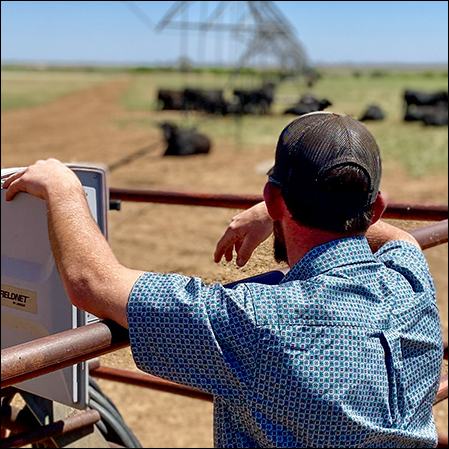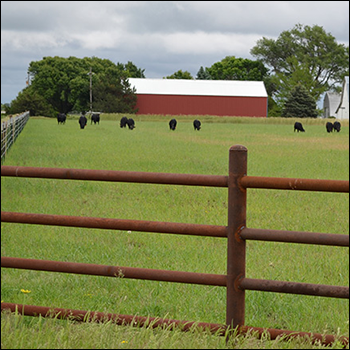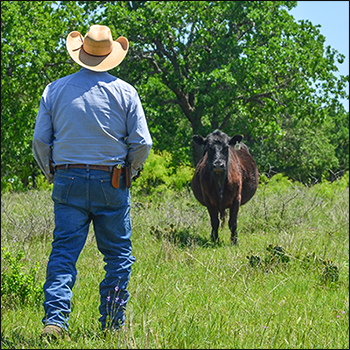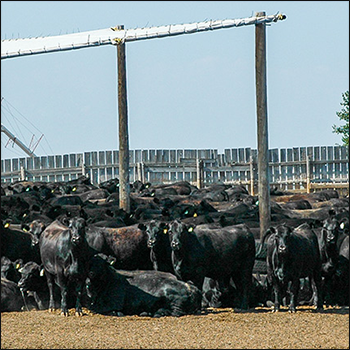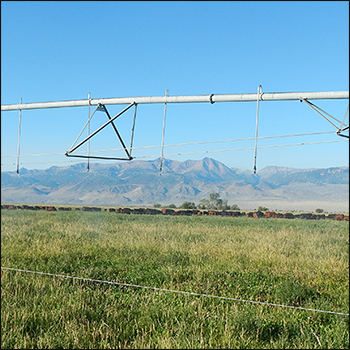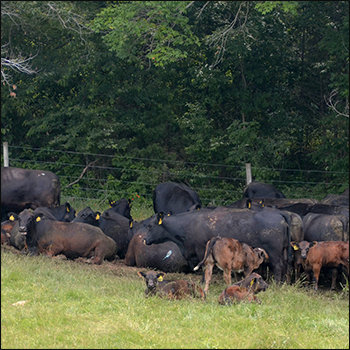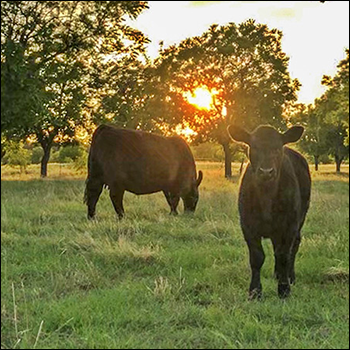
Industry Turmoil
Beef industry organizations meet, discuss viewpoints on marketing finished cattle.
Cattle producers across the country have expressed mounting frustration at the persistent imbalance in the markets. As much of the country lifts pandemic restrictions, consumer demand for U.S. beef remains strong. Producers also have a large supply of cattle to meet demand. Despite this, producers in the cow-calf and feeder sectors are facing significant challenges. The profits yielded by high boxed-beef prices are not being realized by the producers supplying live cattle, and the supply chain is being choked by a lack of processing capacity.
On Monday, May 10, 2021, member leaders of the American Farm Bureau Federation (AFBF), National Cattlemen’s Beef Association (NCBA), National Farmers Union (NFU), Ranchers-Cattlemen Action Legal Fund United Stockgrowers of America (R-CALF USA) and the United States Cattlemen’s Association (USCA) met in Phoenix, Ariz.
These groups convened at the request of the Livestock Marketing Association (LMA) to discuss challenges involved in the marketing of finished cattle with the goal of bringing about a more financially sustainable situation for cattle feeders and cow-calf producers. The group talked openly and candidly about a wide range of important issues facing the industry today, including but not limited to:
- packer concentration,
- price transparency and discovery,
- packer oversight,
- Packers & Stockyards Act enforcement,
- level of captive supply, and
- packer capacity.
The group also agreed to take to their respective organizations for consideration these action items:
- Expedite the renewal of USDA’s Livestock Mandatory Reporting (LMR), including formula-base prices subject to the same reporting requirements as negotiated cash and the creation of a contract library.
- Demand the Department of Justice (DOJ) issue a public investigation status report and, as warranted, conduct joint DOJ and USDA oversight of packer activity moving forward.
- Encourage investment in, and development of, new independent, local and regional packers.
The meeting brought together diverse producer organizations to identify issues and discuss potential solutions. These issues and action-item lists are not comprehensive due to time constraints of the meeting. Attending organization representatives were pleased to have reached consensus on many issues and are committed to the goal of achieving a fair and transparent marketing system for finished cattle.
Disagreements
However, after the meeting, several organizations aired their disagreements.
The North American Meat Institute (Meat Institute) released a document with the aim to clarify common misunderstandings about the complex and competitive beef market in the United States.
“The members of the Meat Institute and their livestock suppliers benefit from a fair and competitive market,” said Meat Institute Vice President of Communications Sarah Little. “This document uses public sources to give an accurate picture of the dynamic beef market, especially given the COVID pandemic.
In July 2020 the USDA analyzed the effects of the 2019 Holcomb facility fire and the pandemic, finding no wrong-doing and confirming the disruption in the beef markets was due to devastating and unprecedented events.
“Despite the pandemic’s challenges, the market is competitive and growing. Since October 2020 there have been several announcements of investments to build new packing facilities or expand capacity at existing plants that would increase cattle slaughter capacity by about 4%, including new independent, local and regional packers,” Little said.
“Meat and poultry companies are utilizing capacity to the best of their abilities with COVID protocol constraints still in place and despite significant labor challenges that existed prior to — and have been exacerbated by — COVID,” Little added. “In fact, Saturday slaughter for the year was 51% above last year and 65% over 2019.”
“Those calling for government intervention in the market never address labor. Labor is, and is likely to remain, a significant factor that affects utilization of production; and is also a factor that will challenge new small and medium-sized facilities entering the market,” she concluded.
USCA President Brooke Miller responded to the document: “USCA appreciates the commitment of U.S. livestock groups to expanding the capacity of our nation’s meat-processing facilities. It would be helpful if the meatpacking lobby, too, focused their attention towards that goal.
“We need proactive solutions at this time, such as research and development of markets for offal and hides, working with trade schools and colleges to recruit skilled labor into the industry, and to address the underlying challenges driving the critical labor shortage across the U.S. This document is neither proactive, nor solutions-oriented,” Miller continued.
“USCA will continue to champion true price discovery and competition in the cattle marketplace — and support the Department of Justice in its investigation of the U.S. meatpacking sector,” he said. “In the meantime, we would greatly appreciate the opportunity to work with the Meat Institute on solutions that support a sustainable future for U.S. cattle producers.”
R-CALF USA announced a drive to encourage 200 members of Congress to join a bipartisan and bicameral letter authored by U.S. Senator Mike Rounds (R-SD) and U.S. Senator Tina Smith (D-MN) that calls attention to the food crisis in America. The letter urges the U.S. Attorney General and Congress to work together to reform the nation’s cattle and beef markets. It explains that consumers are paying an unnecessary, overinflated price for beef in the store while the nation’s cattle ranchers and farmers are on the verge of going broke.
According to R-CALF USA CEO Bill Bullard, the Meat Institute document attempts to dissuade members of Congress from joining the joint Rounds/Smith letter. R-CALF USA offered its rebuttal to the Meat Institute document.
Bullard said the Meat Institute received hundreds of thousands of dollars from the national beef checkoff program during the past four years and is now lobbying against the interests of both cattle producers and consumers who desire meaningful reforms in the cattle and beef markets. He says the Meat Institute document is an attempt to deceive Congress into believing everything is just fine in the cattle and beef markets.
Bullard said the opposite, that the market is completely dysfunctional, marked by consumers paying record-high prices for beef at the store while cattle producers are receiving seriously depressed prices — the same prices they received more than a decade ago. He said the spread between retail beef prices and cattle prices have never been greater, meaning consumers on one end of the food chain and producers on the other are being exploited.
The Meat Institute document claims cattle prices are responding to normal supply and demand signals. Bullard said that is false, evidenced by upward-trending beef prices and downward-trending cattle prices since 2017.
“If cattle prices were responding to supply/demand signals, the exceptional beef demand for the past several years, along with the record exports, would have driven cattle prices upward. Instead, cattle prices have been driven down and consumer beef prices have been driven up,” he said.
The Meat Institute document points out that because cattle producers received COVID-19 subsidies from the government, their income was higher in 2020 than at any time since 2016. However, Bullard said, cattle prices have been seriously depressed since 2014, and the 2020 government subsidies did not come close to restoring the income lost from the dysfunctional cattle market.
“Cattle producers lost in excess of $600 per head in 2020 compared to 2014, yet retail beef prices increased significantly during that period. The COVID payments did not make up that loss even though consumers were paying more than enough for beef to have done so.
“The cattle and beef markets are broken, and the NAMI is trying to fool Congress into complacency, so they don’t do anything about it,” Bullard concluded.
Action wanted from states and industry organizations
Iowa Secretary of Agriculture Mike Naig sent a letter to U.S. Attorney General Merrick Garland requesting that the DOJ expedite its investigation into potential price disparities and anticompetitive practices in the live-cattle market, including the disparity between live-cattle prices and boxed-beef prices.
“Iowa’s hardworking livestock producers have waited for more than a year while the DOJ investigates the pricing disparities in the cattle market. Meanwhile, these cattle producers have watched their profits dwindle,” said Secretary Naig. “It is imperative that the DOJ wraps up this investigation and releases its findings in a timely manner to provide much-needed transparency for Iowa cattle producers.”
The NCBA led a letter with the support of 37 affiliate state cattle organizations, urging the leadership of the U.S. Senate and House Agriculture Committees to address critical areas of concern in the cattle and beef industry.
Specifically, NCBA pushed Sen. Debbie Stabenow (D-MI), Sen. John Boozman (R-AR), Rep. David Scott (D-GA-13), and Rep. Glenn “GT” Thompson (R-PA-15) to consider swift Congressional action to:
- expand beef processing capacity,
- broaden labor policies to strengthen the beef-processing workforce,
- increase transparency in cattle markets by reauthorizing LMR,
- support industry efforts to reform “Product of the USA” generic labeling, and
- ensure proper oversight of cattle market players by concluding the ongoing U.S. DOJ investigation into the meatpacking sector.
“Cattle producers are frustrated, and with good reason. In sale barns and state meetings across the country, we’re hearing the same story of sky-high input costs and intense market volatility. Across the industry, there’s a consensus that market dynamics, which consistently squash producer profitability, are not sustainable for live cattle or beef producers,” said NCBA President Jerry Bohn. “As members of Congress create policy that directly impacts business conditions for our producers, it is critical that they consider the grassroots input and firsthand experiences of folks on the ground. Our letter provides that perspective and reinforces how urgently we need something to shift here to strengthen the security of the beef supply chain. NCBA has strong working relationships with members on both sides of the aisle, we have grassroots policy to back the actions we outlined today, and we hope the conversation in Washington around these critical policy areas will progress quickly.”
Editor’s note: This article is compiled from releases from LMA, AFBF, USCA, R-CALF, NCBA, and the Iowa Department of Agriculture. Photo by Brett Spader.

